Mises, Ludwig von. Human Action: A Treatise on Economics
Подождите немного. Документ загружается.

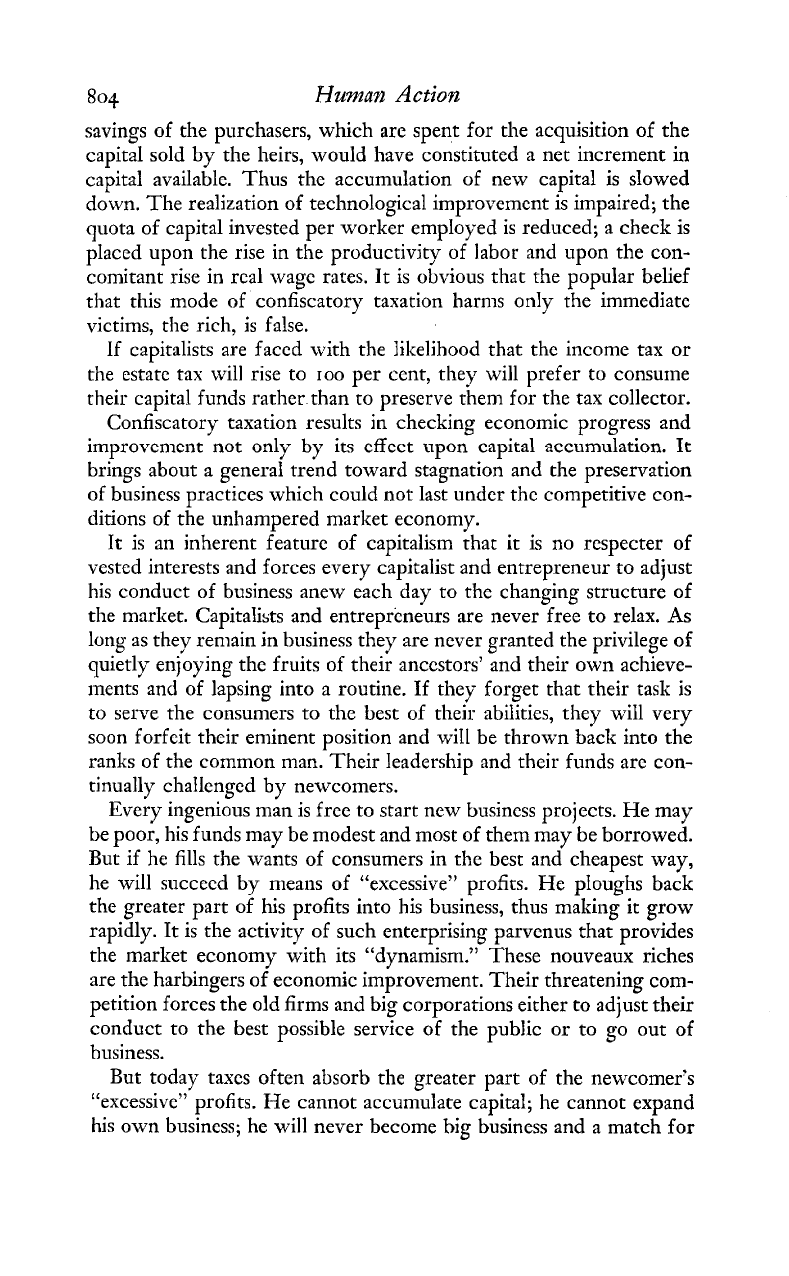
804
Human
Action
savings of the purchasers, which are spent for the acquisition of the
capital sold by the heirs, would have constituted a net increment in
capital available. Thus the accumulation of new capital is slowed
down. The realization of technological improvement is impaired; the
quota of capital invested per worker employed is reduced; a check is
placed upon the rise in the productivity of labor and upon the con-
comitant rise in real wage rates. It is obvious that the popular belief
that this mode of confiscatory taxation harms only the immediate
victims, the rich, is false.
If capitalists are faced with the likelihood that the income tax or
the estate tax will rise to roo per cent, they will prefer to consume
their capital funds rather than to preserve them for the tax collector.
Confiscatory taxation results
in
checking economic progress and
improvement not only by its effect upon capital accumulation.
It
brings about a general trend toward stagnation and the preservation
of business practices which could not last under thc competitive con-
ditions of the unhampered market economy.
It
is an inherent feature of capitalism that it is no respecter of
vested interests and forces every capitalist and entrepreneur to adjust
his conduct of business anew each day to the changing structure of
the market. Capitalists and entrepreneurs are never free to relax. As
long as they remain in business they are never granted the privilege
of
quietly enjoying the fruits of their ancestors' and their own achieve-
ments and of lapsing into a routine. If they forget that their task is
to serve the consumers to the best of their abilities, they will very
soon forfeit their eminent position and wiIl be thrown back into the
ranks of the common man. Their leadership and their funds are con-
tinually chaIlenged by newcomers.
Every ingenious man is free to start new business projects. He may
be poor, his funds may be modest and most of them may be borrowed.
But if he fills the wants of consumers in the best and cheapest way,
he will succeed by means of "excessive" profits. He pIoughs back
the greater part of his profits into his business, thus making it grow
rapidly. It is the activity of such enterprising parvenus that provides
the market economy with its "dynamism." These nouveaux riches
are the harbingers of economic improvement. Their threatening com-
petition forces the old firms and big corporations either to adjust their
conduct to the best possible service of the public or to go out of
business.
But today taxes often absorb the greater part of the newcomer's
L'ex~e~si~e" profits. He cannot accumulate capital; he cannot expand
his own business; he will never become big business and a match for
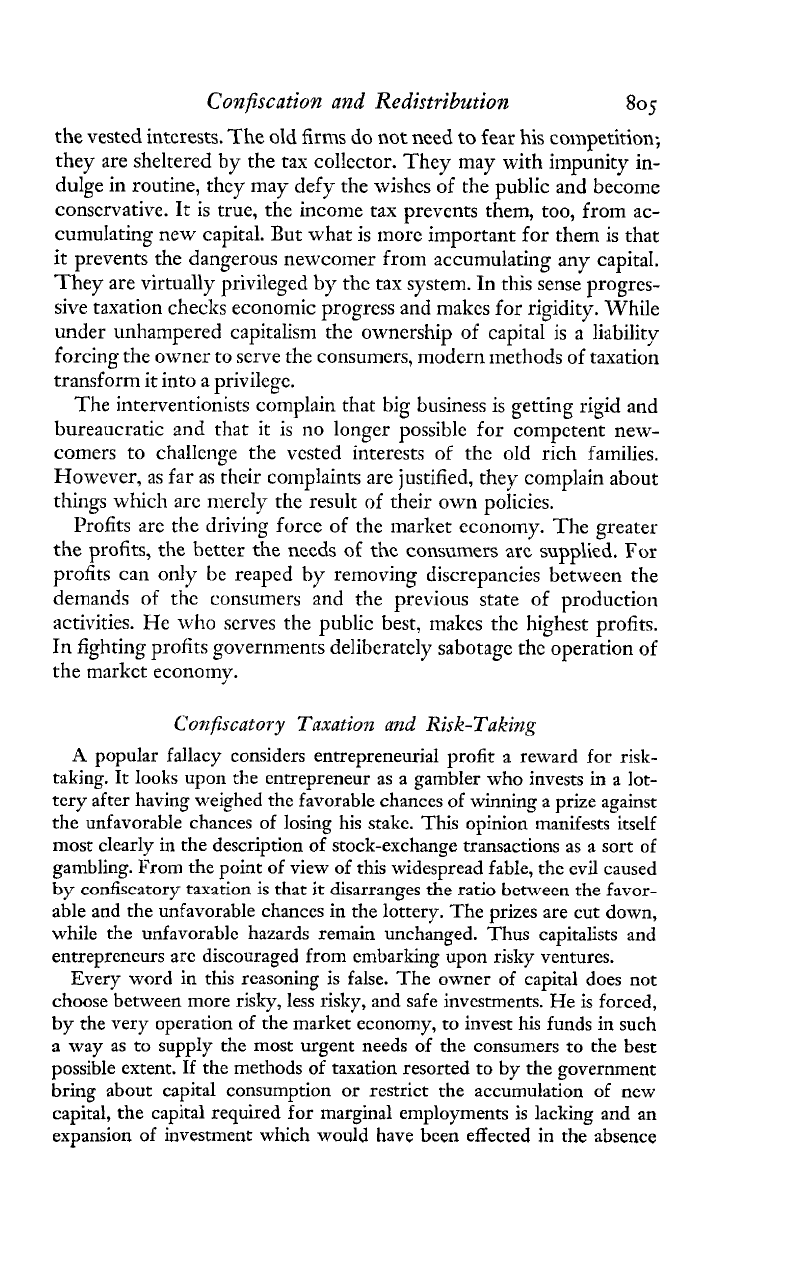
Confiscation and Redistribution
805
the vested interests. The old firms do not need to fear his competition;
they are sheltered by the tax collcctor. They may with impunity in-
dulge in routine, thcy may defy the wishcs of the public and become
conscrvative. It is true, thc income tax prevents them, too, from ac-
cumulating
new
capital. But what is rnorc important for them is that
it prevents the dangerous newcomer from accumulating any capital
They are virtually privileged by thc tax system.
In
this sense progrcs-
sive taxation checks economic progress and makcs for rigidity. While
under unhampered capitalism the
ownership
of capital is a liability
forcing the owner to serve the consumers, modern
net hods
of taxation
transform it into a privilcgc.
The
interventionists
complain that big business is getting rigid and
bureaucratic and that it is no longer possible for competent new-
comers to challenge the vested interests of the old rich families.
Howevcr, as far as thcir coimplaints are justified, they complain about
things which arc merely the result of their own policics.
Profits are the driving force of the market economy. The greater
the profits, the better the necds of the consumers are supplied. For
profits can only
be
reaped by removing discrepancies bctwecn the
demands of thc consumers and the previous state of production
activities. He who scrves the public best, makes thc highest profits.
In fighting profits governments deliberatcly sabotage thc operation of
the markct economy.
Confiscatory
Taxation
and
Risk-Taking
A
popular fallacy considers entrepreneurial profit a reward for risk-
taking. It looks upon the entrepreneur as a gambler who invests in a lot-
tery after having weighed the favorable chances of winning a prize against
the unfavorable chances of losing his stake. This opinion manifests itself
most clearly in the description of stock-exchange transactions as
a
sort of
gambling. From the point of view of this widespread fable, the evil caused
by confiscatory taxation is that it disarranges the ratio bctwecn the favor-
able and the unfavorable chances in the lottery. The prizes are cut down,
while the unfavorable hazards remain unchanged. Thus capitalists and
entrepreneurs are discouraged from embarking upon risky ventures.
Every word in this reasoning is false. The owner of capital does not
choose between more risky, less risky, and safe investments. He is forced,
by the very operation of the market economy, to invest his funds in such
a
way as to supply the most urgent needs of the consumers to the best
possible extent. If the methods of taxation resorted to by the government
bring about capital consumption or restrict the accumulation of new
capital, the capital required for marginal employments is lacking and an
expansion of investment which would have been effected in the absence
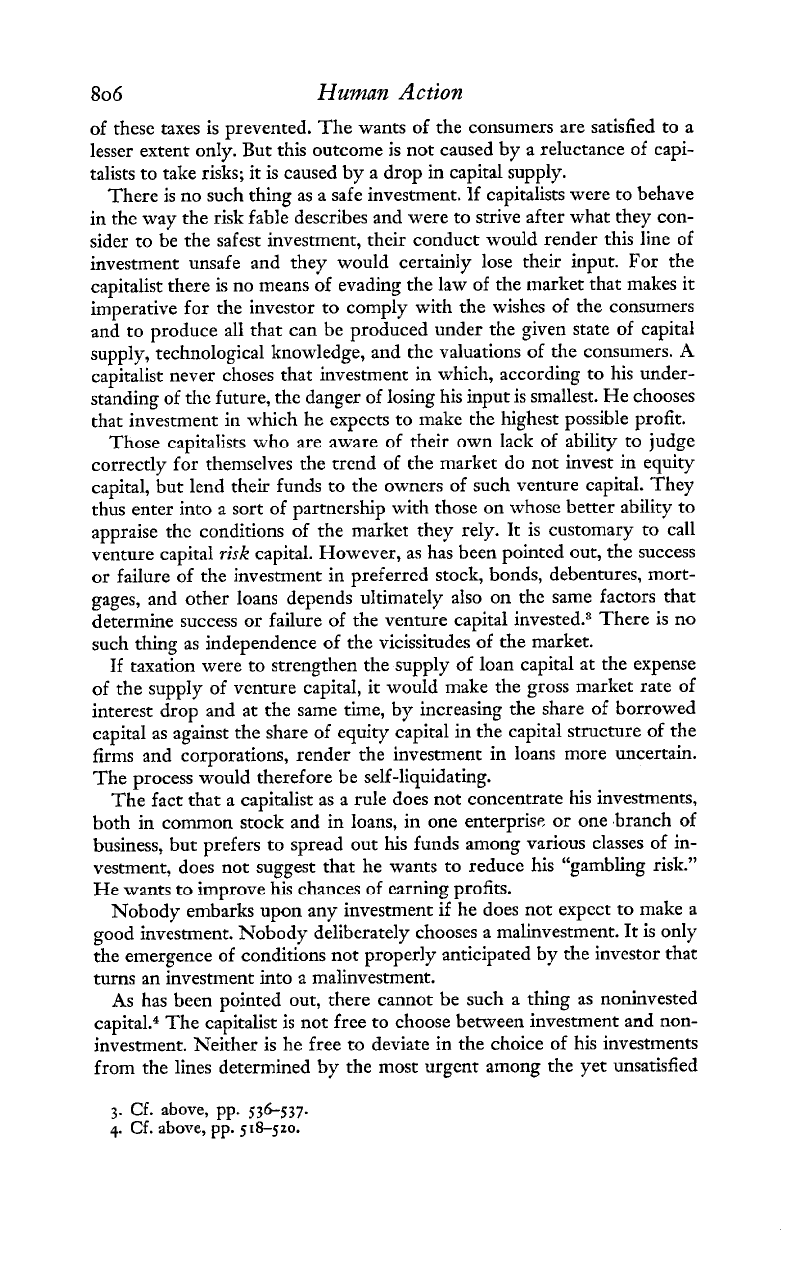
806
Humn
Action
of these taxes is prevented. The wants of the consumers are satisfied to a
lesser extent onIy. But this outcome is not caused by a reluctance of capi-
talists to take risks; it is caused by a drop in capital supply.
There is no such thing as a safe investment. If capitalists were to behave
in the way the risk fable describes and were to strive after what they con-
sider to be the safest investment, their conduct would render this line of
investment unsafe and they would certainly lose their input. For the
capitalist there is no means of evading the law of the market that makes it
imperative for the investor to comply with the wishes of the consumers
and to produce all that can be produced under the given state of capital
supply, technological knowledge, and the valuations of the consumers.
A
capitalist never choses that investment
in
which, according to his under-
standing of the future, the danger of losing his input is smallest. He chooses
that investment in which he expects to make the highest possible profit.
Those capitalists who are aware of their own lack of ability to judge
correctly for themselves the trend of the market do not invest in equity
capital, but lend their funds to the owners of such venture capital. They
thus enter into a sort of partncrship with those on whose better ability to
appraise thc conditions of the market they rely. It is customary to call
venture capital
risk
capital. However, as has been pointed out, the success
or failure of the investment in preferred stock, bonds, debentures, mort-
gages, and other loans depends ultimately also on the same factors that
determine success or failure of the venture capital invested.3 There is no
such thing as independence of the vicissitudes of the market.
If
taxation were to strengthen the supply of loan capital at the expense
of the supply of vcnture capital, it would make the gross market rate of
interest drop and at the same time, by increasing the share of borrowed
capital as against the share of equity capital in the capital structure of the
firms and corporations, render the investment in loans more uncertain.
The process would therefore be self-liquidating.
The fact that
a
capitalist as a rule does not concentrate his investments,
both in common stock and in loans, in one enterprise or one branch of
business, but prefers to spread out his funds among various classes of in-
vestment, does not suggest that he wants to reduce his "gambling risk."
He
wants
EO
imprnve
his
chances
of
earning profits.
Nobody embarks upon any investment if he does not expect to make a
good investment. hTobody deliberately chooses a malinvestment. It is only
the emergence of conditions not properly anticipated by the investor that
turns an investment into a malinvestment.
As has been pointed out, there cannot be such a thing as noninvested
~apital.~ The capitalist is not free to choose between investment and non-
investment. Neither is he free to deviate in the choice of his investments
from the lines determined by the most urgent among the yet unsatisfied
3.
Cf.
above,
pp.
536537.
4.
Cf.
above,
pp.
518-520.
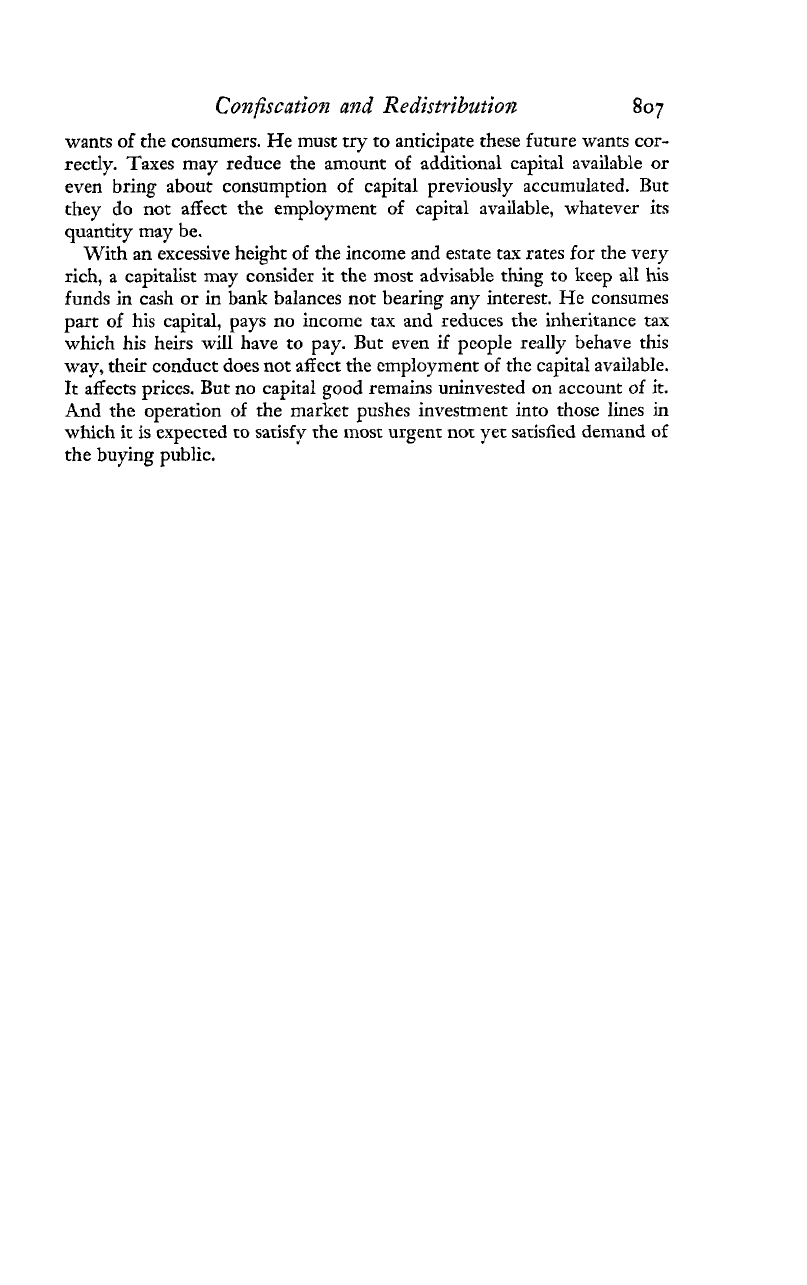
Confiscation
and
Redistribution.
wants of the consumers. He must try to anticipate these future wants cor-
rectly. Taxes may reduce the amount of additional capital available or
even bring about consumption of capital previously accumulated. But
they do not affect the employment of capital available, whatever its
quantity may be.
With an excessive height of
the
income and estate tax rates for the very
rich, a capitalist may consider it the most advisable thing to keep all his
funds in cash or in bank balances not bearing any interest. He consumes
part of his capital: pays no income tax and reduces the inheritance tax
which his heirs will have to pay. But even if people really behave this
way, their conduct does not affcct the employment of the capital available.
It affects prices. But no capital good remains uninvested on account of it.
And the operation of the market pushes investment into those lines in
which it is expected to satisfy the most urgent not yet satisfied demand of
the buying public.
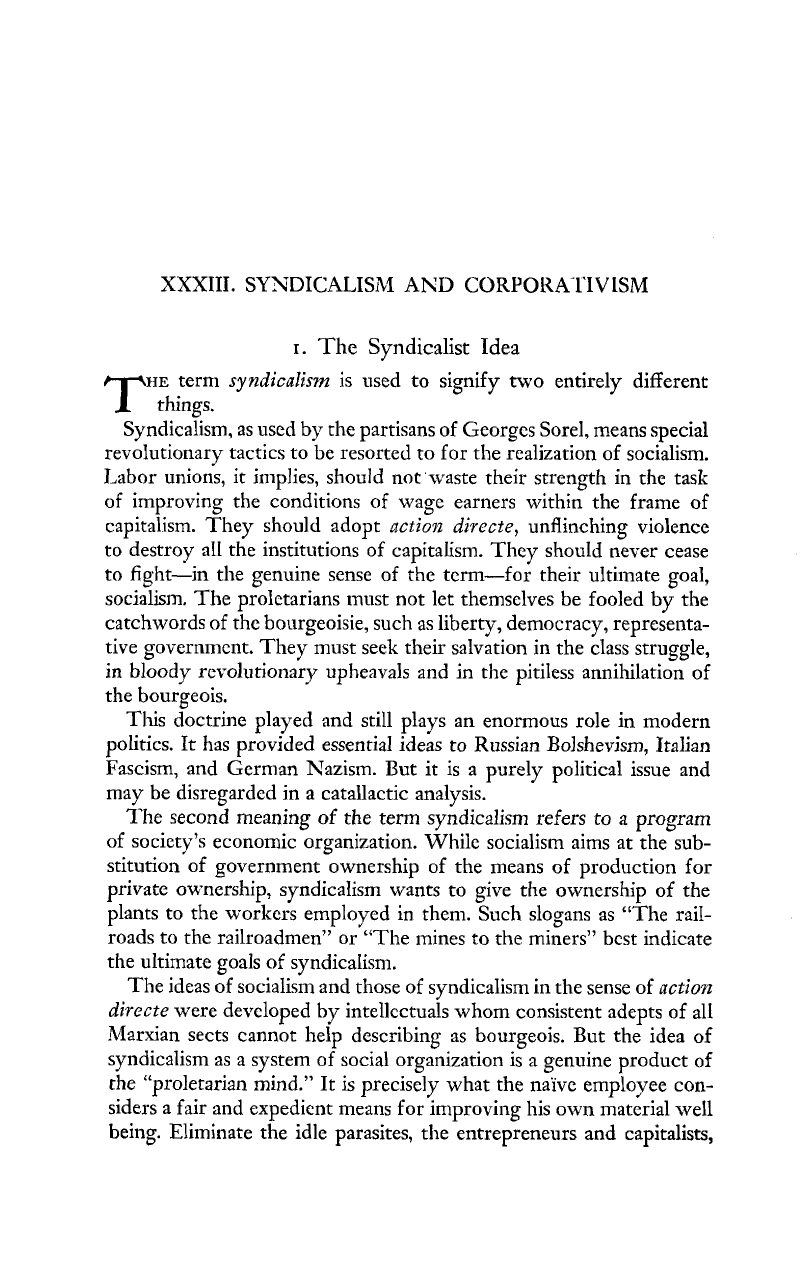
XXXIII. SYNDICALISM
AND
CORPOKAI'IVLSM
I.
The
Syndicalist
Idea
HE
term
syndicalism
is used to signify
two
entirely different
T
things.
Syndicalism, as used
by
the partisans of Georges Sorel, means special
revolutionary tactics to be resorted to for the realization of socialism.
Labor unions, it implies, should nor waste their strength in the task
of improving the conditions of wage earners within the frame of
capitalism. They should adopt
action dirccte,
unflinching violence
to destroy all the institutions of capitalism. They should never cease
to fight-in the genuine sense of the term-for their ultimate goal,
socialism. The proletarians must not let themselves be fooled by the
catchwords of the bourgeoisie, such as liberty, democracy, representa-
tive government. They must seek their salvation in the class struggle,
in
bloody revolutionary upheavals and in the pitiless annihilation of
the bourgeois.
This doctrine played and still plays an enormous role in modern
politics. It has provided essential ideas to Russian Bolshevism, Italian
Fascism, and German Nazism. But it is a purely political issue and
may be disregarded in a catallactic analysis.
The second meaning of the term syndicalism refers to
a
program
of society's economic organization. While socialism aims at the sub-
stitution of government ownership of the means of production for
private ownership, syndicalism wants to give the ownership of the
plants to the workers employed in them. Such slogans as "The raiI-
roads to the railroadmen" or "The mines to the miners" best indicate
the ultimate goals of syndicalism.
The ideas of socialism and those of syndicalism in the sense of
action
directe
were developed by intellcctuals whom consistent adepts of all
Marxian sects cannot help describing as bourgeois. But the idea
of
syndicalism as
a
system of social organization is a genuine product of
the "proletarian mind." It is precisely what the naive employee con-
siders a fair and expedient means for improving his own material well
being. Eliminate the idle parasites, the entrepreneurs and capitalists,
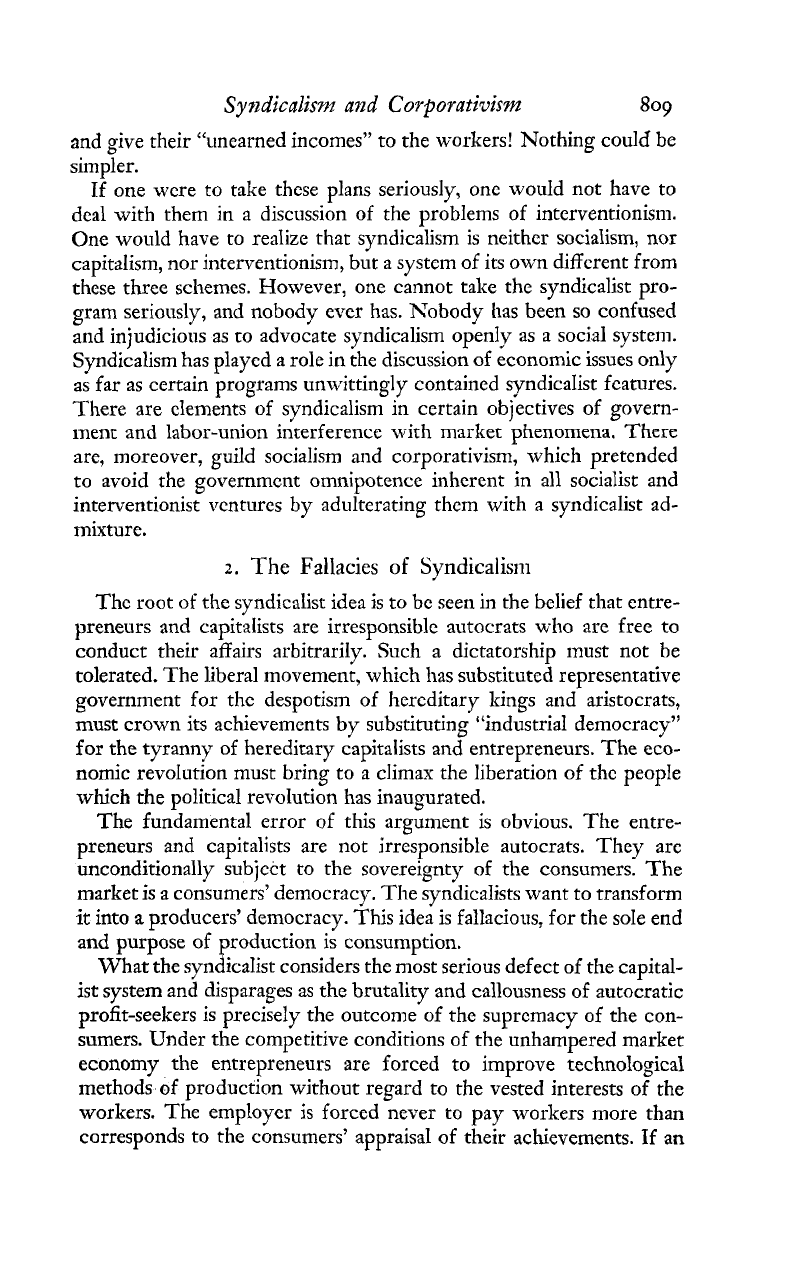
Syndicalism
and
Corporativism
809
and give their "unearned incomes" to the workers! Nothing could be
simpler.
If one were to take these plans seriously, one would not have to
deal with them in a discussion of the problems of interventionism.
One would have to realize that syndicalism is neither socialism, nor
capitalism, nor interventionism, but a system of its own different from
these three schemes. However, one cannot take the syndicalist pro-
gram seriously, and nobody ever has. hTobody has been so confused
and injudicious as to advocate syndicalism openly as a social system.
Syndicalism has played a role in the discussion of economic issues only
as far as certain programs unwittingly contained syndicaIist features.
There are elements of syndicalism in certain objectives of govern-
ment and labor-union interference with market phenomena. There
are, moreover, guild socialism and corporativism, which pretcnded
to avoid the governmcnt omnipotence inherent
in
all
socialist and
interventionist ventures by adulterating them with a syndicalist ad-
mixture.
2.
The
Fallacies of Syndicalism
The root of the syndicalist idea is to be seen in the belief that entre-
preneurs and capitalists are irresponsible autocrats who are free to
conduct their affairs arbitrarily. S~zch a dictatorship must not be
tolerated. The liberal movement, which has substituted representative
government for the despotism of hereditary kings and aristocrats,
must crown its achievements by substituting "industrial democracy"
for the tyranny of heredimry capitalists and entrepreneurs. The eco-
nomic revohtion must bring to a climax the liberation of the people
which the political revolution has inaugurated.
The fundamental error of this argument is obvious. The entre-
preneurs and capitalists are not irresponsible autocrats. They are
unconditionally subjcct to the sovereignty of the consumers. The
market is a consumers' democracy. The syndicalists want to transform
it
into
a
producers' democracy. This idea is fallacious, for the sole end
and purpose of production is consumption.
What the syndicalist considers the most serious defect of the capital-
ist system and disparages as the brutality and callousness of autocratic
profit-seekers is precisely the outcome of the supremacy of the con-
sumers. Under the competitive conditions of the unhampered marker
economy the entrepreneurs are forced to improve technological
methods of production without regard to the vested interests of the
workers. The employer is forced never to pay workers more than
corresponds to the consumers' appraisal of their achievements. If an
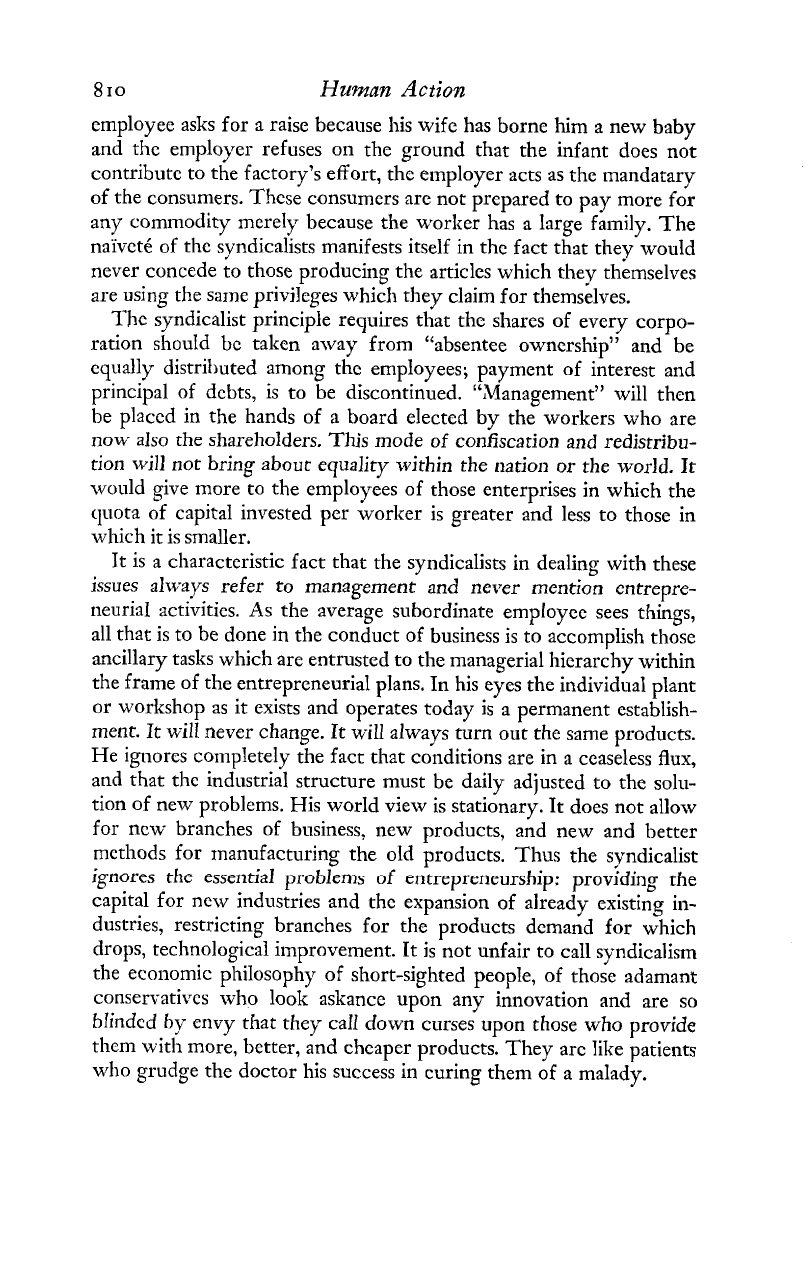
810
Human
Action
employee asks for a raise because his wife has borne him a new baby
and the employer refuses on the ground that the infant does not
contribute to the factory's effort, the employer acts as the mandatary
of the consumers. These consumers are not prepared to pay more for
any commodity merely because the worker has a large family. The
naivete of the syndicalists manifests itself in the fact that they would
never concede to those producing the articles which they themselves
are using the same privileges which they claim for themselves.
The
syndicalist principle requires that the shares of every corpo-
ration should be taken away from "absentee ownership" and be
equally
distributed
among the employees; payment of interest and
principal of debts, is to be discontinued. "Management" will then
be placed in the hands of a board elected by the workers who are
now also the shareholders. This mode of confiscation and redistribu-
tion
will
not
bring
about equality within the nation or the world.
It
would give more to the employees of those enterprises in which the
quota of capital invested per worker is greater and less to those in
which
it is smaller.
Jt is a characteristic fact that the syndicalists in dealing with these
issues always refer to management and never mention cntrepre-
neurial activities. As the average subordinate employee sees things,
all that is to be done
in
the conduct of business is to accomplish those
ancillary tasks which are entrusted to the managerial hierarchy within
the frame of the entrepreneurial plans. In his eyes the individual plant
or workshop as it exists and operates today is a permanent establish-
ment. It will never change.
It
w-ill always turn out the same products.
He ignores completely the fact that conditions are in a ceaseless flux,
and that the industrial structure must be daily adjusted to the solu-
tion of new problems. His world view is stationary. It does not allow
for new branches of business, new products, and new and better
methods for manufacturing the old products. Thus the syndicalist
ignores the essential problems of entrepreneurship: providing the
capital for new industries and the expansion of already existing in-
dustries, restricting branches for the products demand for which
drops, technological improvement. It is not unfair to call syndicalism
the economic philosophy of short-sighted people, of those adamant
conservatives who look askance upon any innovation and are
so
hlindcd
by
envy that they call down curses upon those who provide
them with more, better, and cheaper products. They are like patients
who grudge the doctor his success in curing them of a malady.
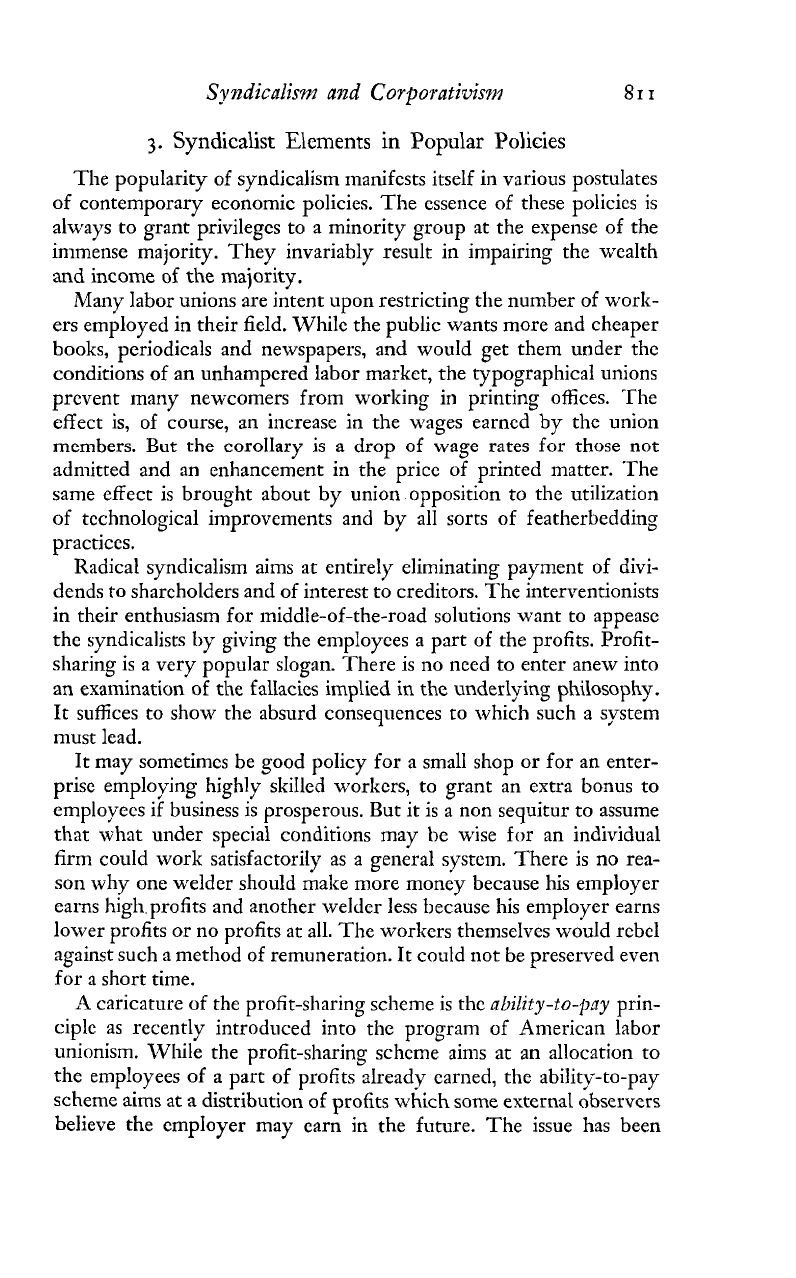
Sy
ndicalisnz and Corporativism
3.
Syndicalist
Elements
in
Popular Policies
The popularity of syndicalism
manifests
itself in various postulates
of contemporary economic policies. The essence of these policies is
always to grant privileges to a minority group at the expense of the
inlmense majority. They invariably result in impairing the wealth
and
income of the majority.
Many labor unions are intent upon restricting the number of work-
ers employed in their field. While the public wants more and cheaper
books, periodicals and newspapers, and would get them under the
conditions of an unhampered labor market, the typographical unions
prevent many newcomers from working in printing offices. The
effect is, of course, an increase in the wages earned by the union
members. But the corollary is a drop of wage rates for those not
admitted and an enhancement in the price of printed matter. The
same effect is brought about by union opposition to the utilization
of technological improvements and by all sorts of featherbedding
practices.
Radical syndicalism aims at entirely eliminating payment of divi-
dends
to
shareholders and of interest to creditors. The interventionists
in their enthusiasm for middle-of-the-road solutions want to appease
the syndicalists by giving the employees a part of the profits. Profit-
sharing is a very popular slogan. There is no need to enter anew into
an examination of the fallacies implied in the underlying philosophy.
It suffices to show the absurd consequences to which such a system
must lead.
It may sometimes be good policy for a small shop or for an enter-
prise employing highly skiIled workers, to grant an extra bonus to
employees
if business is prosperous. But it is a non sequitur to assume
that what under special conditions may be wise for an individual
firm could work satisfactorily as a general system. There is no rea-
son why one welder should make more money because his employer
earns high profits and another welder less because his employer earns
lower profits or no profits at all. The workers
themselves
would rebel
against such a method of remuneration. It could not be preserved even
for a short time.
A
caricature of the profit-sharing scheme is the ability-to-pay prin-
ciple as recently introduced into the program
of
American labor
unionism. While the profit-sharing scheme aims at an allocation to
the employees of
a
part of profits already earned, the ability-to-pay
scheme aims at
a
distribution of profits which some external observers
believe the employer may earn in the future. The issue has been
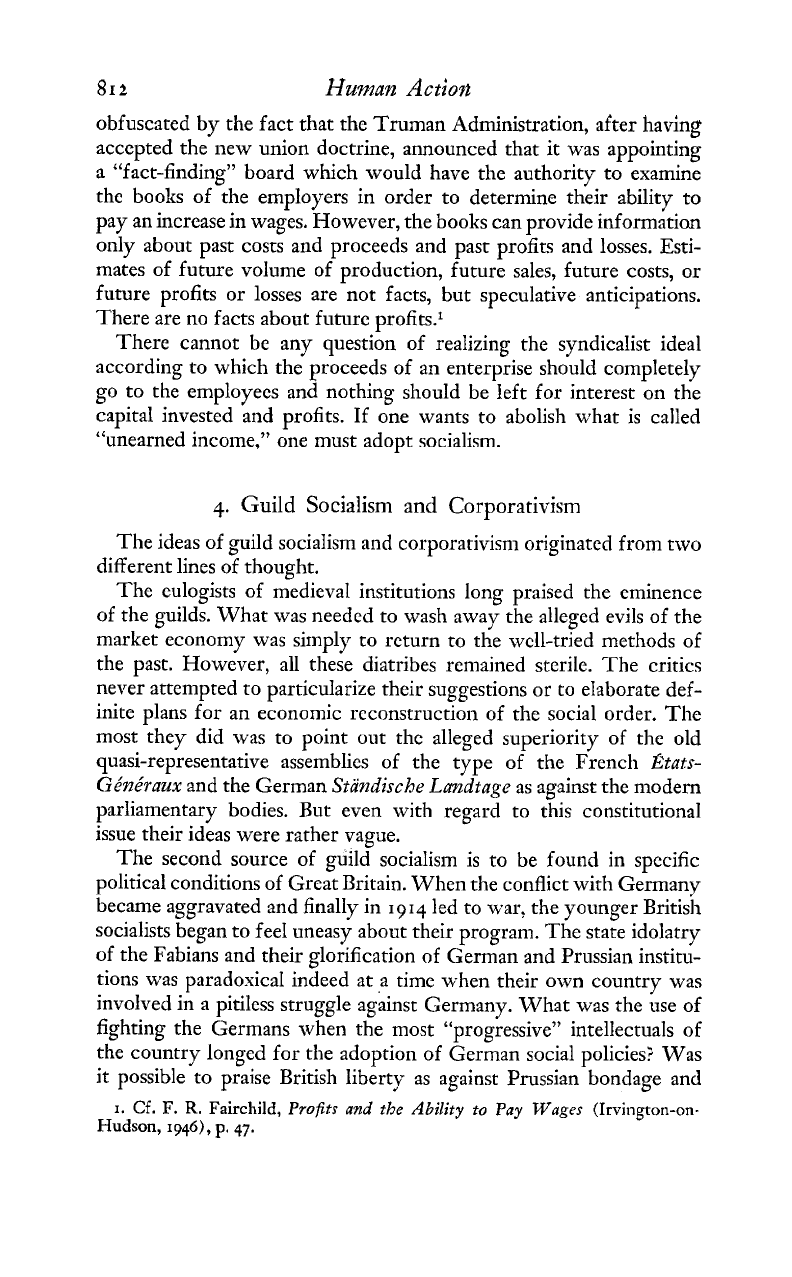
812
Human
Actio~t
obfuscated by the fact that the Truman Administration, after having
acccpted the new union doctrine, announced that
it
was appointing
a "fact-finding" board which would have the authority to examine
the books of the employers in order to determine their ability to
pay an increase in wages. However, the books can provide information
only about past costs and proceeds and past profits and losses. Esti-
mates of future volume
of
production, future sales, future costs, or
future profits or losses are not facts, but speculative anticipations.
There are no facts about future pr0fits.l
There cannot be any question of realizing the syndicalist ideal
according to which the proceeds of an enterprise should completely
go to the employees and nothing should be left for interest on the
capital invested and profits. If one wants to abolish what is called
"unearned income," one must adopt socialism.
4.
Guild Socialism and Corporativism
The ideas of guild socialism and corporativism originated from two
different lines of thought.
The eulogists of medieval institutions long praised the eminence
of the guilds. What was needed to wash away the alleged evils of the
market economy was simply to return to the wcll-tried methods of
the past. However, all these diatribes remained sterile. The critics
never attempted to particularize their suggestions or to elaborate def-
inite plans for an economic reconstruction of the social order. The
most they did was to point out the alleged superiority of the old
quasi-representative assemblies of the type of the French
Etats-
GE'ne'raux
and the German
Standische Landtage
as against the modern
parliamentary bodies. Rut even with regard to this constitutional
issue their ideas were rather vague.
The second source of guild socialism is to be found in specific
political conditions of Grcat Britain. When the conflict with Germany
became aggravated and finally in 1914 led to war, the younger British
sociaIists began to fee1 uneasy about their program. The state idolatry
of the Fabians and their glorification of German and Prussian institu-
tions was paradoxical indeed at a time when their own country was
involved in a pitiless struggle against Germany. What was the use of
fighting the Germans when the most "progressive" intellectuals of
the country longed for the adoption of German social policies? Was
it possible to praise British liberty as against Prussian bondage and
I.
Cf.
F.
R.
Fairchild,
Profits and
the
Ability
to
Pay
Wages
(Irvington-on-
Hudson,
1946)~
p.
47.
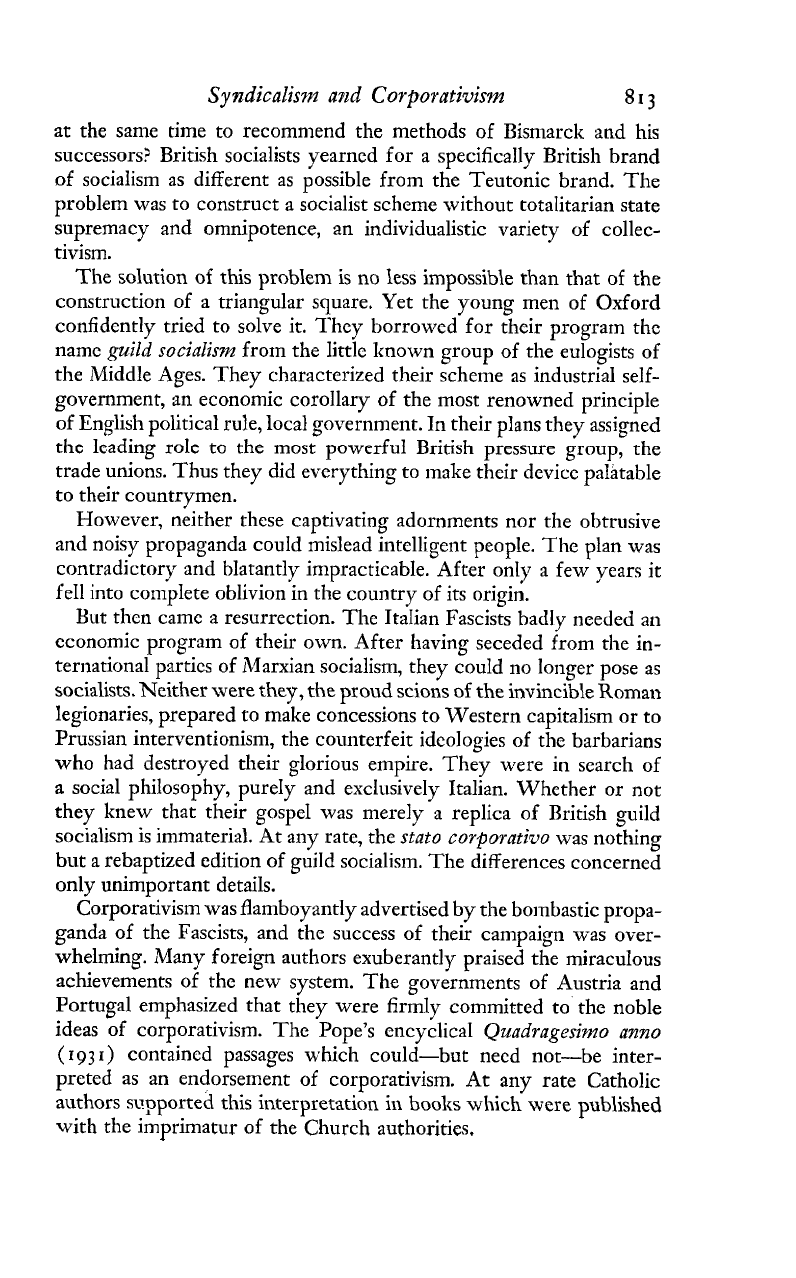
Syndicalism
and
Corporativism
81
3
at the same time to recommend the methods of Bismarck and his
successors? British socialists yearned for a specifically British brand
of socialism as different as possible from the Teutonic brand. The
problem was to construct a socialist scheme without totalitarian state
supremacy and omnipotence, an individualistic variety of collec-
tivism.
The solution of this problenl is no less impossible than that of the
construction of a triangular square. Yet the young men of Oxford
confidently tried to solve it. They borrowed for their program thc
name
guild
socialisnz
from the littlc known group of the eulogists of
the Middle Ages. They characterized their scheme as industrial self-
government, an economic corollary of the most renowned principle
of English political rule, local government. In their plans they assigned
the leading role to the most powerful British pressure group, the
trade unions. Thus they did everything to make their device palatable
to their countrymen.
However, neither these captivating adornments nor the obtrusive
and noisy propaganda could mislead intelligent people. The plan was
contradictory and blatantly impracticable. After only a few years it
feIl into complete oblivion in the country of its origin.
But thcn came a resurrection. The ItaIian Fascists badly needed an
economic program of their own. After having seceded from the in-
ternational partics of Marxian socialism, they could no longer pose as
socialists. Neither were they, the proud scions of the invincible Roman
legionaries, prepared to make concessions to Western capitalism or to
Prussian interventionism, the counterfeit ideologies of the barbarians
who had destroyed their glorious empire. They were in search of
a social philosophy, purely and exciusively Italian. Whether or not
they knew that their gospeI was merely a replica of British guild
socialism is immaterial. At any rate, the
stato corporatiz~o
was nothing
but a rebaptized edition of guild socialism. The differences concerned
only unimportant details.
Corporativism was flamboyantly advertised by the bombastic propa-
ganda of the Fascists, and the success of their campaign was over-
whelming. Many foreign authors exuberantly praised the miraculous
achievements of the new system. The governments of Austria and
Portugal emphasized that they were firmly committed to the noble
ideas of corporativism. The Pope's encyclical
Quadragesirno anno
(
193
I
)
contained passages which could-but need not-be inter-
preted as an endorsement
of
corporativism. At
any
rate Catholic
authors sapported this interpretation in books
which
were published
with the imprimatur of the Church authorities,
